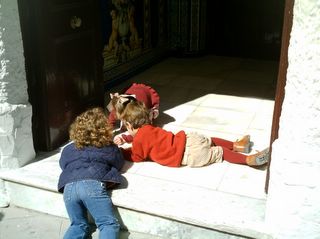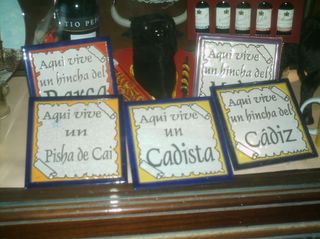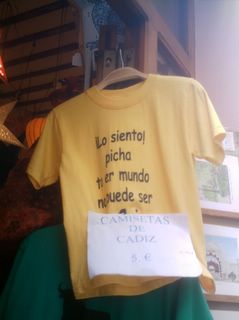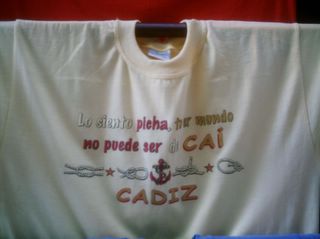I haven’t really noticed this much care being taken to preserve a child’s innocence here in Spain though. Everyone from Great Grandma to Neighbor Pablo from across the street curse a blue streak – children in the vicinity be damned. The first discernable Spanish word I heard and learned upon first visiting this country nearly two years ago was in Barcelona. I was exploring the architecturally rich metropolis and stopped at a lovely little neighborhood park to watch a group of stereotypical Spanish old men (checkered dress shirts, Panama hats, and all) compete in a friendly game of bocce-ball. Their frail, silver-haired wives sat on the benches behind them gossiping away while minding the grandchildren innocently playing at their feet. "¡Coño!" exclaimed one sweet old pensioner as an opponent knocked one of his balls out of the way. A minute or so later, another "¡Coño!" flew out of a different retiree’s mouth as his ball was also, in turn, displaced. By the time the fifth "¡Coño!" had made its appearance, I knew it was time for my faithful little bilingual dictionary and the first true Spanish lesson of my life. [COÑO:- (1) vulgar cunt (2) vulgar interjection fuck me!; for fuck’s sake!]

"Run for the hills, children! Cover your ears! GranPa's playing bocce-ball."
The extensive use of coño throughout the Iberian Peninsula, however, is well documented. It’s the one swear word – well, at least the nastiest – that seems to slip effortlessly into the daily conversations of fellow Spaniards from the Canary Islands to the Pyrenees Mountains. I think that because it is used so often, the word has simply come to lose the power of insult and vulgarism that its English equivalent still possesses. Coño, in my opinion, is now about as much an insult in Spain as "darn" is to a Kansas City grandmother. You use it when you over-bake an apple pie crust and you use it when someone knocks your bocce ball out of the way – whether there are kids around or not.

"¡Coño! This kitty won't sit still. And to top it all off,
I burned my filthy coño of an apple pie this morning too, dang nabbit."
In Cádiz, though, it’s a different story. My neighbors and fellow residents in this city encircled by the ocean are so vulgar that a simple coño will never do. It just doesn’t quite pack that much of a punch down here. Think about it. We’re talking about Cádiz: The oldest port in Europe; Columbus’ point of embarkation on his second and fourth voyages across the Atlantic; Home of the invincible Spanish Armada; Harbor for Napoleon’s mighty Franco-Hispanic fleet (which the British Royal Navy defeated a few miles down the coast at the Battle of Trafalgar); And the Spanish Empire’s only trading link to its vast overseas possessions for well over two centuries. If this city hasn’t seen its fair share of sailors over the years, then I don’t know what city has. The result? These people have sailor-talk pulsing through their veins. Sure they use the ubiquitous coño in the same manner and respect as their fellow countrymen, but the people of Cádiz have come to incorporate the vastly more graphic picha and chocho (locally pronounced piSHa and SHoSHo due to the accent) into their everyday speech as well. Bilingual Spanish dictionary lesson number two: [PICHA:- (1) extremely vulgar cock; prick] [CHOCHO:- (1) extremely vulgar cunt; pussy]

Cádiz: A harbor of sailor-talk for nearly three millennia
So how do the people of Cádiz use these little linguistic treasures? Well, they don’t save them for the occasional game of bocce-ball or apple pie bake, that’s for sure. Picha and chocho are so wide spread in their local usage that I would roughly equate them to my own "man," "buddy," or "pal." Picha for males. Chocho for females. It’s a bit shocking when you first hear it and realize what’s being said, but one eventually grows accustomed to such statements as: "Could you please pass me the menu, picha?" and "Good morning, chocho. That’s a nice dress you’ve got on." Everyone from your grandmother to your newborn baby daughter turns into a chocho and all the men from your crippled veteran grandfather to baby Juan become a picha. I once heard a 12-year-old girl talking to her grandmother and ask, "Where were you yesterday at dinner, chocho. We missed you!"

Nothing says Home, Sweet Home like a "Here lives a piSHa from Cai [Cádiz]" plaque
The simple fact that an observer can overhear a 12-year-old girl calling her Granny a chocho in the middle of town just goes to show how widespread the use of these most vulgar of words is. Customers call shop assistants chochos who in turn tell the other picha customers to wait their turn in line. Wives call their husbands pichas and the husbands call both their mistresses and wives chochos. Each time I’m stopped in the street and asked for either a cigarette, a light, or the time, the request inevitably includes a well-placed picha somewhere before the question mark. But that’s adults and teenagers. What about the kids?

Always an appropriate rear-view mirror decoration for the family car:
"[We're] From Cai [Cádiz], PICHA!"
Well, the little ones’ language here in Cádiz is just as bad as their elders and, no doubt, because of them. A twelve-year-old doesn’t learn chocho by watching Sesame Street. She learns it by listening to her mother and father who probably call her one all the time. And even if they don’t, there are plenty of places to see these words displayed throughout the city. Souvenir shops sell t-shirts with picha and chocho scribbled on the front. Football slogans and local songs incorporate the cussing into their lyrics. Hell, if Cádiz had an anthem, I’m sure it would even be included in that. And as for the Doubting Thomases amongst you, who may believe that one 12-year-old’s foul mouth was probably the exception and not the norm, I should remind you that both my finacée and I teach the little children of Cádiz on a daily basis. Trust me... They’re all well versed in the use of coño, chocho, and picha by the time they hit their eighth birthday.


Mommy, Daddy! Can I please get a "Sorry, PICHA, the whole world can't be from Cádiz" t-shirt!
I'll be the most popular kid in GC Philo's English class!
At the end of the day, though, there’s nothing one can do about it. As vulgar and crude as this may seem to the occasional outsider or tourist with a basic knowledge of Spanish, you eventually realize it’s just the way these sailor descendants speak. If you want to be a part of Cádiz and truly experience its culture, then you have to learn to embrace it and join in the "potty mouth" fun. It may be difficult at first but – as long as you’re not a Bible-Thumper from Mississippi with an innate hatred for anything unGodly – you’ll eventually adapt and learn to let go of any initial inhibitions. Take me for example. I used to punish my pupils for using bad words but have now come to see the error of my ways. What’s the point of me trying to clean up their language in the classroom when their parents use it every five minutes at home? ...An apple doesn’t fall far from the tree. When in Rome, do as the Romans do. If you can’t beat them, join them... I’ve even come up with my own little Cádiz-style proverb: "A picha in the hand is worth two in the bush." Unfortunately, in translation, these words of wisdom are somehow lost on the undiscerning ear.

 The tits are active, noisy and social birds.
The tits are active, noisy and social birds.